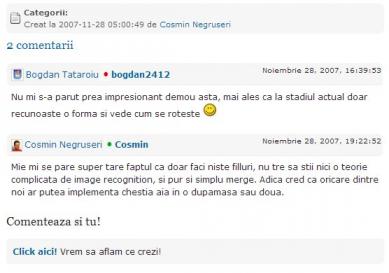Blog infoarena
C++ compiler upgrades on infoarena
We now have the --std=c++0x compiler option enabled on infoarena. We also updated our g++ compiler to 4.8.
What does it mean?
C++ users can now use a bunch of cool features, some of which are briefly described below. Keep in mind that these features are not yet available at OJI, ONI, etc., so don't use them at any of these competitions unless they are allowed explicitly by the regulations.
1. auto
You can now let the compiler infer the type of your variables with auto:
auto a = 45;
auto b = 4.5;
auto c = vector<int>(10);auto can also be used with const auto or const auto&. In most cases, auto cannot be used in function signatures.
2. range-based for loops
In C++11, you can write less code to iterate over every element in a list of elements:
int array[5] = {1, 2, 3, 4, 5};
for (int x: array) {
cout << x << endl;
}If you want to modify the elements in the list, you need to get a reference to the current element:
double array[5] = {1.5, 2.7, 3.9};
for (auto &x: array) {
x *= 2;
}Note: This code compiles without using &, but the original array is not modified unless a reference is used.
3. initializer lists
Simple one-line initializations with lists of constant values:
vector<pair<int, int>> dirs = {{-1, 0}, {0, -1}, {1, 0}, {0, 1}};Note that in C++11 you no longer need to introduce a space between closing right angle brackets (>>).
4. unordered_set, unordered_map
These are hash-based implementations of the well known set and map containers; the average time complexity on most operations is O(1). (These containers were previously available on infoarena under tr1, but only a small fraction of users were actually using them.)
#include <unordered_map>
...
using namespace std;
...
unordered_map<string, int> age = {
{"john", 18}, {"mary", 21}, {"anna", 19}
};
cout << "Anna is " << age["anna"] << " years old." << endl;Using STL vectors, pairs or user defined objects as keys is a little trickier because you also need to provide a hash function.
#include <unordered_set>
#include <vector>
using namespace std;
// Some user defined magic constants used for hashing.
const int P = 666013;
// Courtesy of Adrian Budau
struct myhash {
size_t operator()(const vector<int>& v) const {
size_t value = 1;
for (auto x: v) {
value = value * P + hash<int>()(x);
}
return value;
}
};
...
unordered_set<vector<int>, myhash> s;
vector<int> v = {1, 2, 3};
s.insert(v);You don't need to worry about collisions, unordered_set and unordered_map will take care of them for you.
5. lambda functions
You can now define anonymous functions to write less code. A common application is sorting according to multiple criteria.
#include <algorithm>
using namespace std;
...
vector<int> a = {5, 3, 1, 3};
vector<int> b = {6, 1, 7, 2};
vector<int> ind = {0, 1, 2, 3};
sort(ind.begin(), ind.end(), [&a, &b](int x, int y) -> bool {
return a[x] < a[y] || (a[x] == a[y] && b[x] < b[y]);
});
for (int i: ind) {
cout << a[i] << " " << b[i] << endl;
}(Often, a cleaner alternative to using lambda functions for sorting is to define a class holding all the data for each entry and to implement the < operator.)
Let us know in the comments section what are the C++11 features that you use for programming contests. Code snippets illustrating your favorite tricks are welcome.
Surse libere pentru problemele rezolvate din arhive
După cum bine ştiţi, infoarena şi-a pus de mult timp problema accesului liber la toate sursele trimise de concurenţi, atît cele din timpul rundelor de concurs cît şi cele din arhivă. Există argumente atît pro cît şi contra, iar o decizie în această direcţie nu a putut fi luată pînă acum.
În urmă cu trei luni am decis în timpul unei şedinţe să cerem părerea comunităţii. Am creat un poll pe forum, iar rezultatele le puteţi vedea aici. Discuţia pe marginea acestui subiect a devenit foarte interesantă şi a atras multe păreri. Rezultatul sondajului a fost indecis, scorul final fiind 29 - 29 :).
Luînd în considerare toate argumentele aduse şi discutînd cu mai mulţi membri ai comunităţii am decis că cea mai bună soluţie este să facem sursele libere doar pentru acei concurenţi care au rezolvat deja problema integral. Împreună cu Bogdan-Cristian Tataroiu •bogdan2412 am lucrat aceste zile la această schimbare, iar acum puteţi vedea toate soluţiile trimise pentru problemele pe care le-aţi rezolvat deja. Această măsură se aplică doar pentru arhiva de probleme şi pentru arhiva monthly.
Spor la treabă în continuare!
Avem comentarii!
Cristi si Mircea au simplificat modul in care se pot face comentarii pe blog. Daca sunteti curiosi de detaliile tehnice va puteti uita la changeurile facute aici si aici . Comentariile arata acum asa:

Mai ar fi de lucru, dar e un pas mare in fata ca utilizabilitate.

